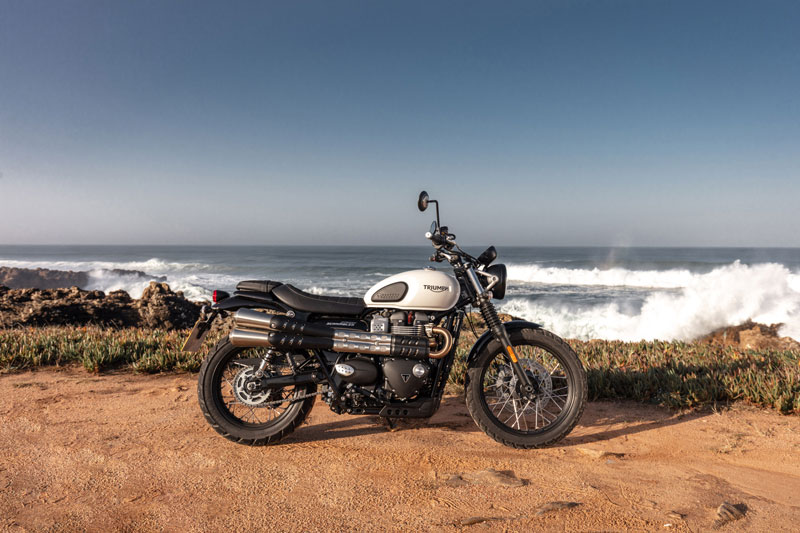2019 Triumph Street Scrambler

First Ride Review
Triumph’s 2017 Street Scrambler, powered by the 900cc “high-torque” parallel twin used in the Street Twin, rolled into the gap left by the departure of the previous generation Scrambler two years ago. With less weight, more power and a slightly modernized look, it has proven to be a popular choice in Triumph’s modern classic line, and for 2019 it has received a refresh that includes a bump in mid-range power, a new cartridge-style fork and a Brembo front brake.
As its name suggests, the Street Scrambler is primarily a road-going machine (those looking for more than just light off-roading adventures should give the all-new Scrambler 1200 a hard look), and after riding it and its Street Twin sibling (which received similar changes this year) back-to-back at the press launch in Portugal, the Street Scrambler’s upright, commanding riding position proved to be well-suited to navigating the urban jungle.
With its wide handlebar and footpegs mounted below and a bit forward of the 31.1-inch seat to aid in standing, I found the Street Scrambler fit my 5-foot, 9-inch frame well. Although its new 41mm KYB cartridge fork has the same 120mm (4.7 inches) of travel as before, it has a wider stance and feels just a tad beefier, though not intrusively so. Rear suspension, with 4.7 inches of travel and adjustable for preload only, is unchanged.
At 135 pounds, I weigh less than the “average” rider for whom most bikes this size are sprung, but I could still detect an improvement in rebound damping up front that made for a slightly more plush ride. The rear is still rather harsh, so if it were mine, I’d invest in lighter springs up front and a set of Triumph’s accessory Fox shocks for the back.
Performance from the single 310mm-disc front brake has been improved, with an opposed 4-piston Brembo caliper replacing the old 2-piston Nissin unit; a floating 2-piston Nissin still squeezes the 255mm rear disc. The difference is noticeable, with more bite up front and better lever feel, increasing confidence when riding aggressively or in the rain.
The big news, though, is the increase in power, a claimed 18 percent more peak horsepower to be exact, plus a flatter torque curve that delivers in the “real-world” range of 3,500 to 5,500 rpm, achieved via a minor retune and a few lighter bits in the engine–a magnesium cam cover, a lighter crankshaft, dead shafts and the balance shafts that ride on them, a mass-optimized clutch cover and a lighter clutch.
Based on the Jett Tuning dyno results in our Rider Test of the identically-powered 2016 Street Twin, the increase should translate to 62 peak horsepower arriving close to the higher 7,500-rpm redline, with peak torque unchanged at 57 lb-ft at 3,200 rpm. The seat-of-the-pants result is a new sense of urgency and more get up and go in the mid- to high-end; on our first ride in the mountains near Lisbon, Portugal, I felt it most noticeably during 40-mph roll-ons and when accelerating out of corners, reducing the need to downshift.
The dual-counterbalanced engine has a bit of a V-twin character infusion thanks to a 270-degree firing interval, with a feather-light assist clutch (with adjustable lever, thank you Triumph!) operating the 5-speed gearbox. Despite its dirty overtures, the Street Scrambler is geared fairly tall, and I didn’t find myself missing a sixth gear even cruising at 70 mph on the freeway; I’m guessing most Scrambler buyers aren’t looking to cruise at triple digits anyway. The soundtrack is classic Triumph, surprisingly throaty and with a pleasant amount of burble on deceleration.
Harnessing all this is a smooth throttle-by-wire system with standard 2-channel ABS and switchable traction control, but new this year is the addition of Road, Rain and Off-Road ride modes. Road is the default setting; while Rain softens throttle response and increases traction control intervention, power output is unchanged. Off-Road leaves the throttle map in snappy Road mode and turns ABS and traction control completely off. Rain and Road modes are easily selectable on the fly using a large button on the left switchgear; the bike must be stationary to select Off-Road mode.
Our riding day in Portugal was blessedly sunny, but it had rained for several days prior so we were warned to use caution (and Rain mode) on the shady, twisty mountain roads. It was a double-duty press launch, with Triumph giving us first rides on both the Street Twin and Street Scrambler. We were assigned one model for the morning and one for the afternoon, swapping at lunch as well as the four photo stops, giving us the unique experience of getting to ride these similar yet oh-so-different bikes back-to-back. It quickly became apparent that they are indeed two distinct motorcycles that will likely appeal to different riders, and not just because of their aesthetics.
I started the day on a Street Scrambler, and as I already noted it felt immediately comfortable. Though suspension travel is identical to the Street Twin, the Street Scrambler is fitted with longer springs front and rear that, along with the 19-inch front wheel, contribute to its feel as a larger machine. It’s not my imagination–though it has shed a few pounds since last year the Scrambler is still about 10 pounds heavier than the Twin, and a glance at the spec sheet shows it’s also longer, taller and wider at the bars.
In the morning, when the roads were still quite damp, I kept my Scrambler in Rain mode; because it maintains full engine power, I found the slightly softer throttle response to be easier to modulate as we negotiated the unfamiliar–and often quite bumpy–twists and turns, without feeling too heavily reined-in. As the roads dried out and I swapped back and forth on each bike in Road mode, I found myself appreciating their unique experiences.
The Street Twin felt smaller, lighter and surprisingly sporty. Its tubeless Pirelli Phantom Sportscomp tires (rolling on cast aluminum wheels, 18 inches up front and 17 at the rear) were working better on the dry pavement than they had in the morning, and despite the narrow bar I was able to flick the Twin through corners easily.
Yet despite its expanded dimensions and heavy spoked steel wheels (with that larger 19 up front), I felt quicker on the Street Scrambler. Maybe it was the added leverage from the wider bar, and the Metzeler Tourance ADV-style tires were performing very well regardless of road conditions…but it could just be that I was more comfortable. A quick poll of my fellow journalists seemed to support that theory; smaller folks liked the Twin, taller ones the Scrambler.
I really liked the first generation, but as a fun, stylish, accessible scrambler-style ride this new Street Scrambler is even better than before–better enough, in fact, to seriously tempt me into making one my own.
